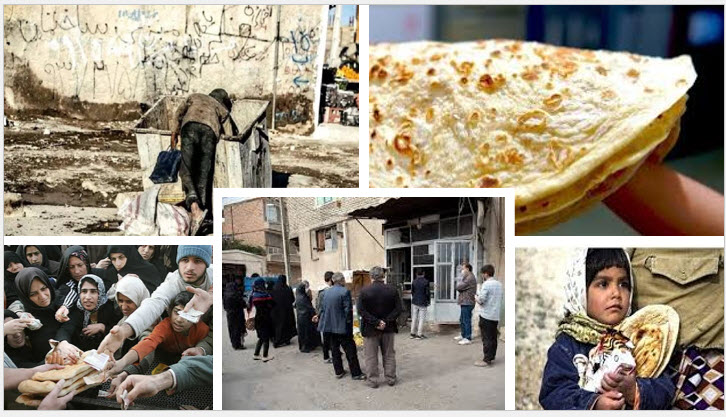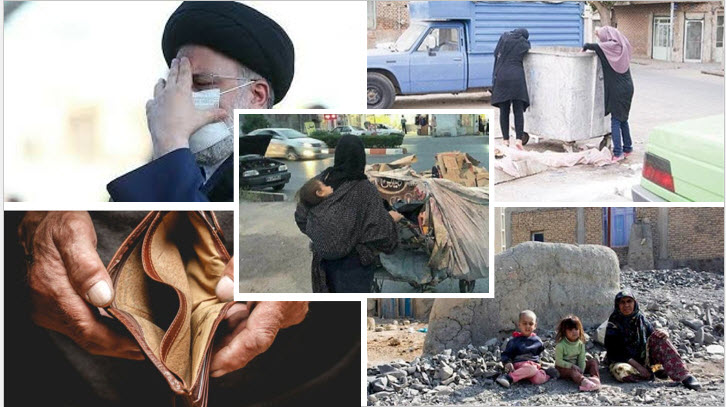
Following the Iranian regime’s decision to raise the price of flour and remove subsidized bread from the shelves, observers in Iran believe that nationwide protests will soon take place. Even before his government’s first anniversary, President Ebrahim Raisi has broken promises about ‘eliminating absolute poverty,’ ‘constructing one million homes,’ and ‘supporting the underprivileged.’
“Mr. Raisi; didn’t Prophet Mohammad say, ‘Damn be upon who accepts a task without knowledge?” asked Fazel Meybodi, a low-ranking mullah at Qom Howzeh [an Islamic Seminary] in response to the regime’s president’s inadequacy and failure.
Meybodi also questioned the regime’s Supreme Leader Ali Khamenei’s authority, warning that “the people’s ‘riot’ is more dangerous than a revolution” after he purged Raisi’s rivals during the 2020 Presidential election to appoint his protégé.
Hassan Rouhani, Raisi’s so-called “reformist” predecessor, increased the price of gas by 200 percent on November 15, 2019, causing hundreds of thousands of citizens to protest across the country. Two days later, Khamenei declared his support for the price hikes and stymied a bill in the Majlis (Parliament) to reduce them.

Protesters were referred to as “rioters and hooligans” by Khamenei, who also ordered the Islamic Revolutionary Guard Corps (IRGC) to “do whatever it takes to put an end to [protests].” The IRGC used helicopters, armored vehicles, heavy machineguns, snipers, and live ammunition to put down the nationwide protests, killing over 1,500 people and injuring many more. Raisi, backed by the IRGC, has now targeted people’s staple food.
To make up for their massive budget deficits, the authorities have raised flour and bread prices at a time when the country is in the midst of an economic crisis caused by the regime’s mismanagement and waste of national wealth on terrorism and nuclear ambitions.
The main state-run television channel announced on April 26 that the price of flour would rise from 25,000 rials ($0.09) per kilogram to 120,000 to 169,000 rials ($0.42-0.60) per kilogram. The regime’s critical conditions were revealed eight days later by the official IRNA news agency, which wrote in a May 4 publication, “The crisis is [too dangerous] as the only remaining solution is to remove subsidies, implying a stellar increase in the bread price.”
Following the increase in flour prices, bread prices increased as well, with baguettes seeing a 13-fold increase. “Sandwich prices have reached 300,000 to 500,000 rials [$1.07-1.78],” the Eslahat News website reported on May 3, citing state media. Falafel is no longer available for purchase; the bread alone costs 100,000 rials ($0.35).”
In addition to price increases, the regime has yet to adjust minimum wages to keep up with the country’s skyrocketing inflation. “High prices have significantly emptied working families’ product baskets in less than two months,” the semiofficial ILNA news agency reported on May 7. The minimum wage was increased by 57 percent this year, but food prices increased by more than 200 percent on average, resulting in a 150 percent decrease in ‘workers’ real wages.'”
At the same time, the Ministry of the Economy announced that bread would be rationed. For a loaf of bread, the people will have to pay $0.35. Because the minimum wage for workers is $100 per month, every working family of 3.3 people would have to pay $106 per month to receive three loaves of bread per day, which is simply unaffordable given other expenses.
Raisi is reportedly putting a cap on price hikes, according to the Iranian government. “The President will not allow the bread to become more expensive in such circumstances,” Cabinet spokesperson Ali Bahadori Jahromi was quoted as saying in an article on the Jamaran website on May 6.
To make up for their massive budget deficits, the authorities have raised flour and bread prices at a time when the country is in the midst of an economic crisis caused by the regime’s mismanagement and waste of national wealth on terrorism and nuclear ambitions.
 MEK Iran (follow us on Twitter and Facebook), Maryam Rajavi’s on her site, Twitter & Facebook, NCRI (Twitter & Facebook), and People’s Mojahedin Organization of Iran – MEK IRAN – YouTuB
MEK Iran (follow us on Twitter and Facebook), Maryam Rajavi’s on her site, Twitter & Facebook, NCRI (Twitter & Facebook), and People’s Mojahedin Organization of Iran – MEK IRAN – YouTuB







